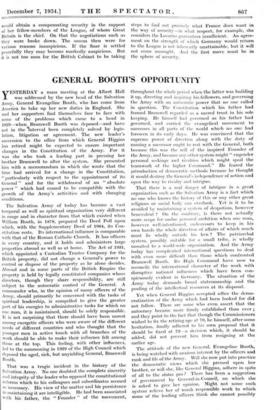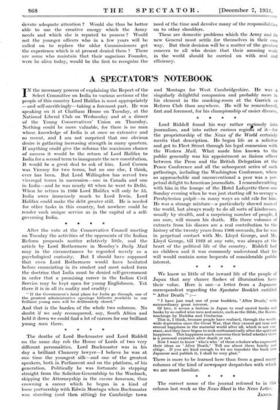GENERAL BOOTH'S OPPORTUNITY
YESTERDAY a mass meeting at the Albert Hall was addressed by the new head of the Salvation Army, General Evangeline Booth, who has come from America to take up her new duties in England. She and her supporters find themselves face. to face with some of the problems which came to a head in 1929—when Bramwell Booth was deposed—and have not in the Interval been completely solved by legis- lation, litigation or agreement. The new leader's succession to the office from which General Higgins has retired might be expected to ensure important changes in the Constitution of the Army. For it was she who took a leading part in pressing her brother Bramwell to alter the system. She presented him with a memorandum in which she wrote that the time had arrived for a change in the Constitution, " particularly with respect to the appointment of its General " and for the withdrawal of an " absolute power " which had ceased to be compatible with the growth of the Army's activities and with changing conditions.
The Salvation Army of today has become a vast temporal as well as spiritual organization very different in range and in character from that which existed when William Booth, in 1878, prepared the Deed Poll upon which, with the Supplementary Deed of 1904, its Con- stitution rests. Its international influence is comparable with that of the Roman Catholic Church. It has officers in every country, and it holds and administers large properties abroad as well as at home. The Act of 1931, which appointed a Custodian Trustee Company for the British property, did not change a General's power to control or dispose of the property as he alone decides. Abroad and in some parts of the British Empire the property is held by legally constituted companies whose directors, though they share responsibility, are still subject to the autocratic control of the General. A commander who, in the opinion of many officers of the Army, should primarily be concerned with the tasks of spiritual leadership, is compelled to give the greater part of his energies to administrative tasks for which no one man, it is maintained, should be solely responsible. It is not surprising that there should have been unrest among energetic officers who were aware of the different needs of different countries and who thought that the younger men in active touch with all branches of the work should be able to make their influence felt among those at the top. This feeling, with other influences, led to the summoning in 1929 of the High Council which deposed the aged, sick, but unyielding General, Bramwell Booth.
That was a tragic incident in the history of the Salvation Army. No one doubted the complete sincerity and integrity of the leader who opposed the constitutional reforms which to his colleagues and subordinates seemed se necessary. His view of the matter and his persistence in maintaining it are intelligible. He-had been associated with his father, the " Founder " of the movement, throughout the whole period when the latter was building it up, directing and inspiring his followers, and governing the Army with an autocratic power that no one called in question. The Constitution which his father had framed Bramwell regarded as a sacred trust in his sole keeping. He himself had governed as his father had governed, and carried the evangelical movement to successes in all parts of the world which no one had foreseen in its early days. He was convinced that the supreme power of direction along with the duty of naming a successor ought to rest with the General, both because this was the will of the inspired Founder of the Army, and because any other system might " engender personal seekings and rivalries which might spoil the teamwork of the higher Command." He feared the introduction of democratic methods because he thought it would destroy the General's independence of action and open the way to rivalry and intrigue.
That there is a real danger of intrigue in a great organization such as the Salvation Army is a fact which no one who knows the history of this or any other great religious or social body can overlook. Yet is it to be avoided by maintaining a system of despotism, however benevolent ? On the contrary, is there not actually more scope for undue personal ambition -when one man, however well-intentioned, endeavours to keep in his own hands the whole direction of affairs of which much must lie wholly outside his ken ? The patriarchal system, possibly suitable for a small tribe, is wholly unsuited to a world-wide organization. And the Army today has complicated international questions to deal with even more difficult than those which confronted Bramwell Booth. Its High Command have now to reconcile the international character of the work with disruptive national influences which have been con- spicuously evident in Germany. The situation of the Army today demands broad statesmanship and the pooling of the intellectual resources at its disposal.
Yet when General Higgins accepted office the demo- cratization of the Army which had been looked for did not follow. There arc some who even assert that the autocracy became more firmly established than ever ; and they point to the fact that though the Commissioners wished to fix the retiring age at 70, he himself, after some hesitation, finally adhered to his own proposal that it should be fixed at 73—a decision which, it should be added, did not prevent him from resigning at the earlier age.
The attitude of the new General, Evangeline Booth, is being watched with anxious interest by the officers and rank and file of the Army. Will she now put into practice the democratic views which she pressed upon her brother, or will she, like General Higgins, adhere in spite of all to the status quo ? There has been a suggestion of government by General-in-Council, on which she is asked to give her opinion. Might not some such system relieve her of much responsible work to which some of the leading officers think she cannot possibly devote adequate attention ? Would she thus be better able to use the creative energy which the Army needs and which she is reputed to possess ? Would not the younger officers who in a few years will be called on to replace the older Commissioners get the experience which is at present denied them ? There are some who maintain that their sagacious Founder, were he alive today, would be the first to recognize the need of the time and devolve many of the responsibilities on to other -shoulders.
These are domestic problems which the Army and its new General must settle for themselves in their own way. But their decision will be a matter of the greatest concern to all who desire that their amazing work in the world should be carried on with zeal and efficiency.



















































 Previous page
Previous page